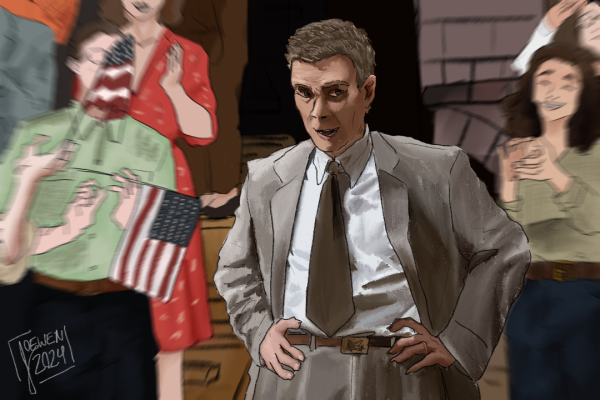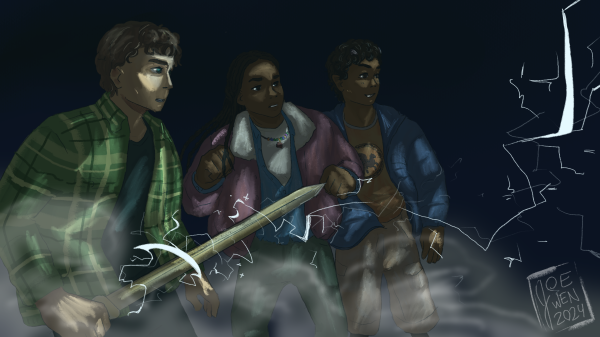‘Jeen-Yuhs,’ is a riveting tale of Kanye West: from college dropout to billionaire
A unique drawing of Kanye West’s first album and fist Grammy winning album “The College Dropout”. This album was his gateway to success and is monumental.
Well-known rapper and 21-time Grammy Award winner Kanye West (Ye) was recently featured in the Netflix documentary “Jeen-Yuhs: A Kanye Trilogy” showcasing the steps taken and the struggles endured on his path to fame. With his amazing hunger to succeed, he shows how far he will go to reach that success. For haters and fans alike, “Jeen Yuhs” keeps you on the edge of your seat while watching Ye’s progression to success.
Through footage and uplifting commentary, Ye uses his avid determination to propel himself to the top of the music industry, but is also subject to how wealth and power can severely corrupt someone – “Jeen-Yuhs” is a looking glass of that. “Jeen-Yuhs” is meant to give insight on Ye’s road to fame and how hard he had to fight for it.
“Act 1: Vision” the coming of age for one of the greatest music artists of our time.
This act gives contextualization to how the journey of this documentary started. The opening is present-day Ye in 2020 while he is brainstorming a verse for a possible new song and takes a break to attend to a phone call about his hapless presidential campaign. Still, he is busy and seems lenient toward the camera in his face.
Then, there is a blast into the late 2000s (around 2010) where Clarence Simmons (Coodie) is filming Ye. Coodie had foresight that Kanye would become notable because he stood out and now is evidently a witness of his success.
The appearance of hundreds of other artists starving for their big break shows how competitive the hip-hop industry was at the time. By the end of Act 1, Ye has barely gotten his feet off the ground by earning his first record deal. Constantly advocating for himself and his dreams, he gives all he has in hopes of getting a record deal as an artist and to be taken seriously. Despite him being an infant to the industry, his talent was undeniable, and Ye’s mother, Donda, helped him believe in himself, causing him to reach the success he has achieved today.
“Act 2: Purpose” – working hard to establish himself at Roc-A-Fella; if there is a will, there’s a way.
This act exhibits how Ye broke the boundaries of typical “gangsta-rap” and made a name for himself, enduring trials and tribulations along the way. It is obvious how he hustled restlessly to get respect for his name, as Roc-A-Fella Records only gave him respect as a producer. Ye wanted to be a rapper, not a rapper-producer, a rapper.
As seen today, he obtained this respect. Roc-A-Fella would not give him the time of day if it was regarding him and his dreams of releasing his first album, and it is known that if you want something done right – do it yourself. Shockingly, Coodie tells the audience about “the news that changed everything.” Ye had been in a car accident in LA that left him with a jaw wired shut for the weeks that he was planning to spend on his debut album “The College Dropout.”
This didn’t stop Ye, it actually inspired him, becoming a pivotal point in the process of creating his debut album. He fostered this struggle into fame by making the song “Through the Wire.” Coodie, being one of Ye’s rocks through this time of his life and donating much of his time to help him pave his path to success, took less credit than he deserved putting the spotlight on Ye.
After snippets of the creative process and producing process of “The College Dropout” are shown, Ye’s success is appreciated as his debut album’s success took him higher than he could have ever imagined.
“Act 3: Awakening” – being knocked down by depression only fueled Ye’s burning passion to succeed in honor of Donda.
While “Act 1: Vision” showed Ye’s earliest days on the stairs to success and “Act 2: Purpose” showed his struggles, Act 3 shows the effects of his electrifying success.
Act 3 is a little different because directors Coodie and Chike were cut off from Ye’s life (temporarily) because, at the time, he got conceited and discarded those who had been there for him on his journey to getting there. It is more of a “through the looking glass” perspective rather than an inside perspective.
The act opens with one of Ye’s many controversial encounters with Rhymefest, a common collaborator. From this encounter, we can see that Donda gave Ye an abundant amount of confidence to impel him throughout the industry.
Donda passed away in 2007, which took a large toll on Ye. Ye has changed for the worse since then, showing how her absence has affected his mental health. Memories of Donda and Ye’s earlier days are shown through film and, seeing how close they were, it makes sense this tragic event sent him adrift. The film style is different as Coodie shows parts of his life and how it changed with less footage of Ye shown. Summarizing some of the audacious things Ye has done in these past few years, it ultimately demonstrates how the journey became a full circle.
“Jeen-yuhs”’ is a noteworthy documentary showing that all of Ye’s work was worthy because he found people who believed in him but, most importantly, he believed in himself. Coodie does an outstanding job showing the audience how Ye succeeded without repeating himself. Ye has already shown the world how successful he is for the last 20 years anyway.
This captivating documentary shows the layers of Ye’s journey to the top, ultimately revealing his aspiration for what he does.
If you like stories of trials, tribulations and triumph, “Jeen-yuhs” is for you.












Grace Howard • Mar 31, 2022 at 1:59 pm
Great story, highly recommend ?